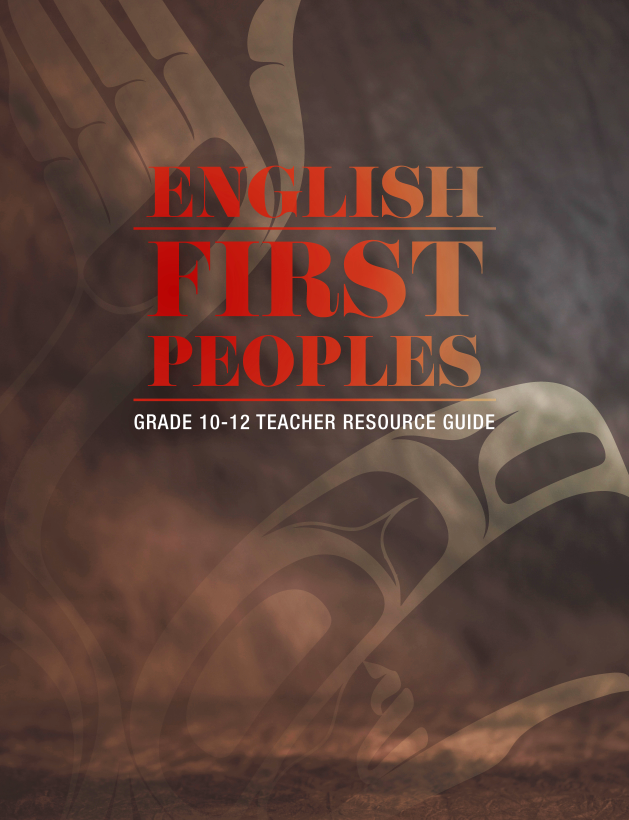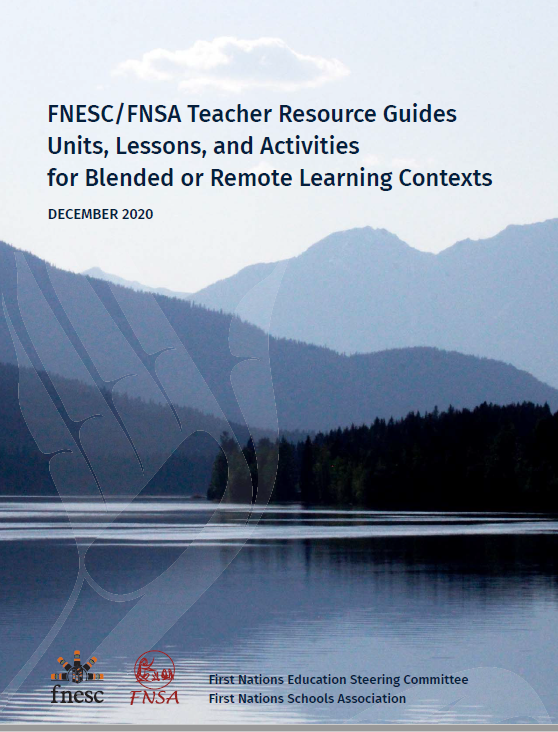
The FNESC/FNSA English First Peoples 10-12 Teacher Resource Guide (2018) is designed provide support for the British Columbia’s English First Peoples 10-12 curriculum. It includes diverse units, lessons and activities to support the revised EFP 10-12 and ELA 10-12 curriculum using dynamic, rich written, oral, visual, and digital First Peoples literature/text, and reflects evolving educational practice.
This guide amalgamates and replaces two previous FNESC resource guides: the English First Peoples 12 Teacher Resource Guide (2008) and the English First Peoples 10 and 11 Teacher Resource Guide (2010). It includes new material that reflects recent changes to the curriculum, more recently published First Peoples literature, and evolving educational practice.
The guide has the following goals:
- to contribute to reconciliation for all by building greater understanding of the skills, knowledge, and perspectives of First Peoples for all students
- to ensure the inclusion of First Peoples knowledge and perspectives is done respectfully and without appropriating First Peoples knowledge
- to encourage and support the respectful development of local teaching and learning resources
- to provide support for the implementation of the BC English First Peoples 10-12 provincially prescribed curriculum
English First Peoples (EFP) courses are an exciting addition to the high school curriculum that offers students of all backgrounds the opportunity to explore First Peoples’ worldviews through literature, founded on the First Peoples Principles of Learning. The courses were developed in unique collaboration between the BC Ministry of Education and First Nations Education Steering Committee.
We encourage parents, teachers and students to ask for English First Peoples 10, 11, and 12 courses to be added to course calendars and to raise awareness that EFP 12 is equivalent to English 12 for BC post-secondary entrance requirements.
For a hardcopy of this resource, please use our publications form to order. Quantities are limited.
We welcome your feedback on our resources.
Want to offer English First Peoples in your school? For support and tips, contact us.
Adaptation Ideas
See FNESC/FNSA Teacher Resource Guides, Units, Lessons, and Activities for Blended or Remote Learning Contexts (Dec. 2020) for adaptation ideas relating to this publication. This guide is designed to identify the units, lessons and/or activities within FNESC/FNSA teacher resource guides that can be most readily adapted for remote or blended learning situations.

Resources
Blackline Masters
Introduction
1 People Search Icebreaker
2 Learning Journals
3 Participation in Group Discussions
Challenges with Representation
1 Evaluating Websites
2 Evaluating Authenticity
3 Sample Scoring Guide
In Search of Authentic First Peoples’ Voice
1 Reel Injun Focus Questions
2 How to Write a Film Review
3 Scoring Guide
First Peoples Oral Traditions
1 Learning Journal Overview
2 Group Work Self Assessment
Childhood Through the Eyes of Indigenous Writers
1 Picture Book Gallery Walk
2 Beliefs and Values about Children
First Peoples’ Story
1 Reflect Guide
2 Guest Presenter Note-taking Guidance
We Are Our Stories
1 The Truth About Stories Discussion Guide
Beats and Bytes
1 Placemat Activity
2 Final Project Overview
3 Group Work Assessment Rubric
Place-Conscious Learning – Exploring Text Through Local Landscape
1 Image Response Template
2 Important Places
3 Developing a Deeper Understanding
4 Reflections on My Heart Soars
5 Extended Metaphor Assignment
6 Metaphor Paragraph
7 Graphic Organizer for Extended Metaphor
8 Graphic Organizer for Extended Metaphor
Identity
1 Maintaining Safe Space Online
2a Anticipation Guide Absolutely True Diary
2b Anticipation Guide April Raintree
2c Anticipation Guide Code Talker
2d Anticipation Guide Night Wanderer
3a Lit Circle Prompts Absolutely True Diary
3b Lit Circle Prompts April Raintree
3c Lit Circle Prompts Code Talker
3d Lit Circle Prompts Night Wanderer
4 Lit Circle Weekly Response Rubric
5 Lit Circle Weekly Commenting Rubric
6 Character Analysis
7 Four Square Exploration
8b Exploring Trauma in April Raintree
8c Exploring Trauma in Code Talker
8d Exploring Trauma in Night Wanderer
9 Soundtrack Assignment
Understanding Character
1 Identity Map
2 Development of the Protagonist
How Do We Define Ourselves?
1 Reading and Discussion Guide Keeper’n Me
2 Keeper’n Me Book One
3 Keeper’n Me Book Two
4 Keeper’n Me Book Three
5 Keeper’n Me Book Four
6 Questions for the Boy in the Ditch
7 Poetry Structured Group Roles
The Politics of Identity
1 Excerpt from N’tacimowin inna nah
Belonging
1 How Maui Fished up the North Island
2 Maui Retelling Rubric
3 Collaborative Research Project Rubric
4 Oral Presentation Rubric
5 Power of Words
6 Symbolic Meaning of Flowers
7 Rubric for a Visual Project
8 Whale Rider Chapter 9 Questions
9 What is Irony Video Notes
10 Prejudice, Discrimination, and Stereotypes
11 Whale Rider Chapters 10 and 11 Questions
12 The Character Kahu
What Creates Family?
1 One Page Response
2 Literature Circle Discussion Questions
First Steps Exploring Residential Schools and Reconciliation
1 What Do you Know about Residential Schools?
2 Map of BC Residential Schools
3 Double Entry Journal First Steps
Further Steps Toward Reconciliation
1 Stages in the Relationships
2 Novel Discussion Guide
3 Post-Discussion Reflection
4 Historical Voices Scott and Anderson
5 Historical Voices Bryce
6 Reflection on Historical Voices
7 Propaganda Comparison Chart
8 The Official Apology
9 Script Excerpts
Relationships: Families, Friendships, Communities
1 A Local Focus Quotations
2 RAFT Writing Templates
3 Reader Response Planning and Assessment
4a Reader Response Questions Medicine River
4b Reader Response Questions Night Wanderer
4c Reader Response Questions Absolutely True Diary
4d Read Response Questions Dream Wheels
5 Body Biography
6 Concept Map Assignment
7 Making Connections with Questions
8 Character Write
9 Protecting our Land
Lost People
1 Writing Reader Responses
2 Monkey Beach Reader Response
3 Indian Horse Reader Response
You Want Me to Write a What? The Literature Essay
1 Student Guide
2 Peer Feedback Form
3 Essay Assessment Rubric
Yes, there is Funny Stuff
1 Group Research Project Assignment
2 Collaborative Research Project
3 Oral Presentation Rubric
4 Group Performance Assignment
5 Concept Map
6 Hank Williams First Nation Jigsaw
7 Reader Responses for Yin Chin
8 Poetry Graphic Organizer
9 Guide to Writing a Literary Essay
10 Scoring Guide
The Trickster – a Recurring Presence
1 Who is the Trickster?
2 Trickster Concept Map
3 Trickster Concept Map Example
4 Concept Map Criteria
5 Trickster Jigsaw Discussion
The Trickster – a Hard Character to Pin Down
1 Highway on the Trickster
2 Armstrong on the Trickster
3 Vizenor on the Trickster
4 Trickster in Stories
Digital Trickster
1 Types of Citizens
2 Group Work Assessment
Visit this folder for links to EFP 10-12 Blackline Masters, organized by unit.
